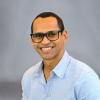Elena Schaa - "Heisenberg's Experience of the Matrix Mechanics on Helgoland."
Over the past hundred years, physics has undergone a major revolution with the development of quantum mechanics. Unlike the theory of relativity, this development relied on the international collective effort of many researchers and quickly spread worldwide, inspiring significant further contributions in different countries and cultures. While the theory contained many puzzling features and generated considerable discontent and philosophical debate, quantum concepts penetrated many fields of scientific research, both in and beyond physics, irrevocably transforming the foundations of many disciplines and the scientific worldview writ large. New technologies and devices built on quantum principles and effects have fundamentally transformed human societies and some of the most essential aspects of daily life.
The Quantum Century Working Group aims to explore these historical changes – intellectual, technological, philosophical, cultural, and social – brought about by the development of quantum physics and complex interactions between theory, experiment, and various applications. One hundred years after it was constructed, quantum mechanics remains one of the central pillars of modern science and the source of life-changing innovations. It continues to answer previously unresolved problems and generate new puzzles promoting research further into unexplored territories. We invite papers representing the variety of scientific and technological experiences associated with the quantum worldview and its development over the last century, reflecting the practices of science in wider social and intellectual contexts in different disciplines, geographies, and cultures.
Conveners
Alexander Blum
Jinyan Liu
Climério Paulo da Silva Neto
Past Meetings
-
-
Women in the History of Quantum Physics: Beyond Knabenphysik
The editors Patrick Charbonneau, Michelle Frank, Margriet van der Heijden, and Daniela Monaldi will join us for a discussion of the book Women in the History of Quantum Physics: Beyond Knabenphysik.
"Capturing the stories of sixteen women who made significant contributions to the development of quantum physics, this anthology highlights how, from the very beginning, women played a notable role in shaping one of the most fascinating and profound scientific fields of our time. Rigorously researched and written by historians, scientists, and philosophers of science, the findings in this interdisciplinary book transform traditional physics historiography. Entirely new sources are included alongside established sources that are examined from a fresh perspective. These concise biographies serve as a valuable counterweight to the prevailing narrative of male genius, and demonstrate that in the history of quantum physics, women of all backgrounds have been essential contributors all along. Accessible and engaging, this book is relevant for a wide audience including historians, scientists and science educators, gender theorists and sociologists."
Women history quantum physics ibeyond knabenphysiki | Cambridge University Press
-
Alexei Kojevnikov - Quantum physics in the Soviet Union
Kojevnikov will present the history of quantum mechanics in the Soviet Union, building on previous research on Theoretical Physics in the Context of the Cultural Revolution.
-
Johannes Hagmann - Light and Matter: An exhibition in the International Year of Quantum Science and Technology at the Deutsches Museum
The exhibition "Light and Matter" presents the foundations of quantum optics and demonstrates historically how our understanding of light and matter has evolved over the past century. These new insights are essential for the fields of quantum science and quantum technologies, which are both active areas of intensive research today. The exhibition, which was developed in cooperation with the Cluster of Excellence “Munich Center for Quantum Science and Technology” (MCQST), was opened in the summer of 2024 and will be shown throughout the International Year of Quantum Science and Technology in 2025.
The present talk will introduce a behind-the-scenes view of the development process of the exhibition, including the scholarly work as well as the collection and interpretation of material culture in the field of quantum optics. It will highlight selected aspects of the exhibition's messages and narratives, including the dual-use potential of Cold War research, research in the two Germanies in the field of laser physics, and the presentation of the contributions of women in the history of quantum optics to the general public.
-
Alex Blum and Martin Jähnert - "Quantum mechanics, radiation, and the equivalence proof." Archive for the History of Exact Sciences (2024).
-
Wright, Aaron Sidney. “Nascent Pairs and Virtual Possibilities.” In More than Nothing: A History of the Vacuum in Theoretical Physics, 1925-1980. New York: Oxford University Press, 2024. https://doi.org/10.1093/oso/9780190062804.003.0003.
Aaron Sidney Wright is Associate Professor at the Department of History of Dalhousie University and the History of Science and Technology Program of the University of King’s College.
More than Nothing is available in Oxford Academic (online) and Chapter 1 (the Introduction) is available free at this link.
-
Alexander Blum - Sharing Plans and Ideas for the 2025 Quantum Centenary
Group Conveners

Climério Paulo da Silva Neto
Climerio Paulo da Silva Neto is an Associate Professor of physics and history of science at the Federal University of Bahia and the author of the book Materializing the Foundations of Quantum Mechanics. His research deals with the history of physics in the 20th century from the perspective of the circulation of materials, knowledge, and ideologies, through real and imaginary boundaries such as nation states, racial, gender, and political affiliations. He is currently investigating the Socialist approach to scientific internationalism and science diplomacy during the Cold War based on case studies from Soviet physics. He holds a master's and a PhD in History and Philosophy of Science and Science Teaching from the Federal University of Bahia. He has been a professor of History of Science at the Federal University of Western Bahia (2015-2020), Brazil, and a visiting scholar at the History Department of Drexel University (2023-2024).